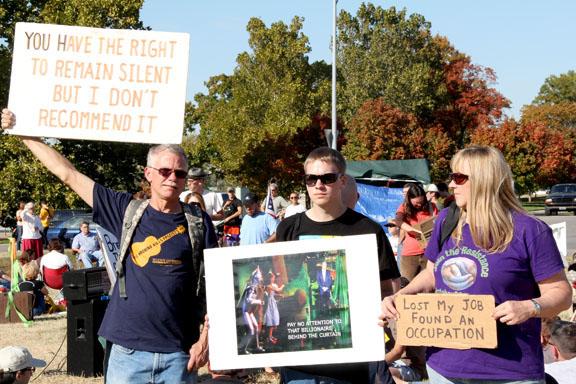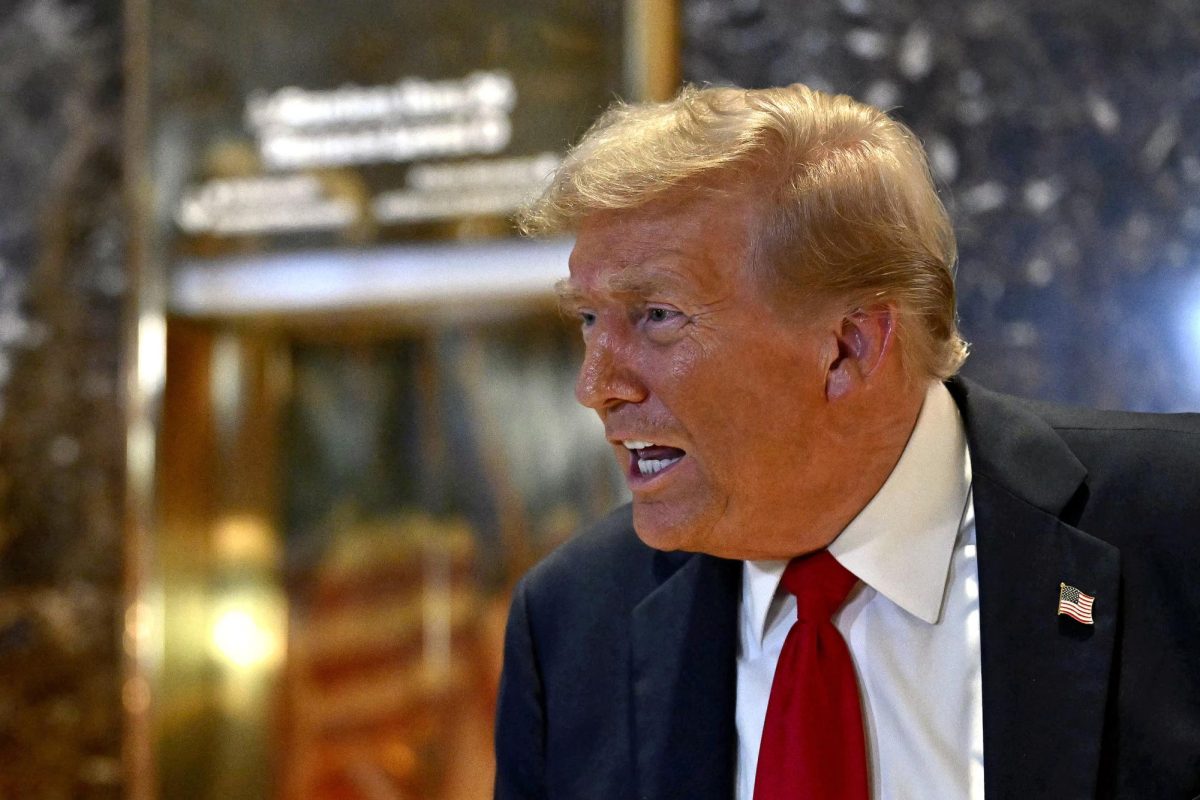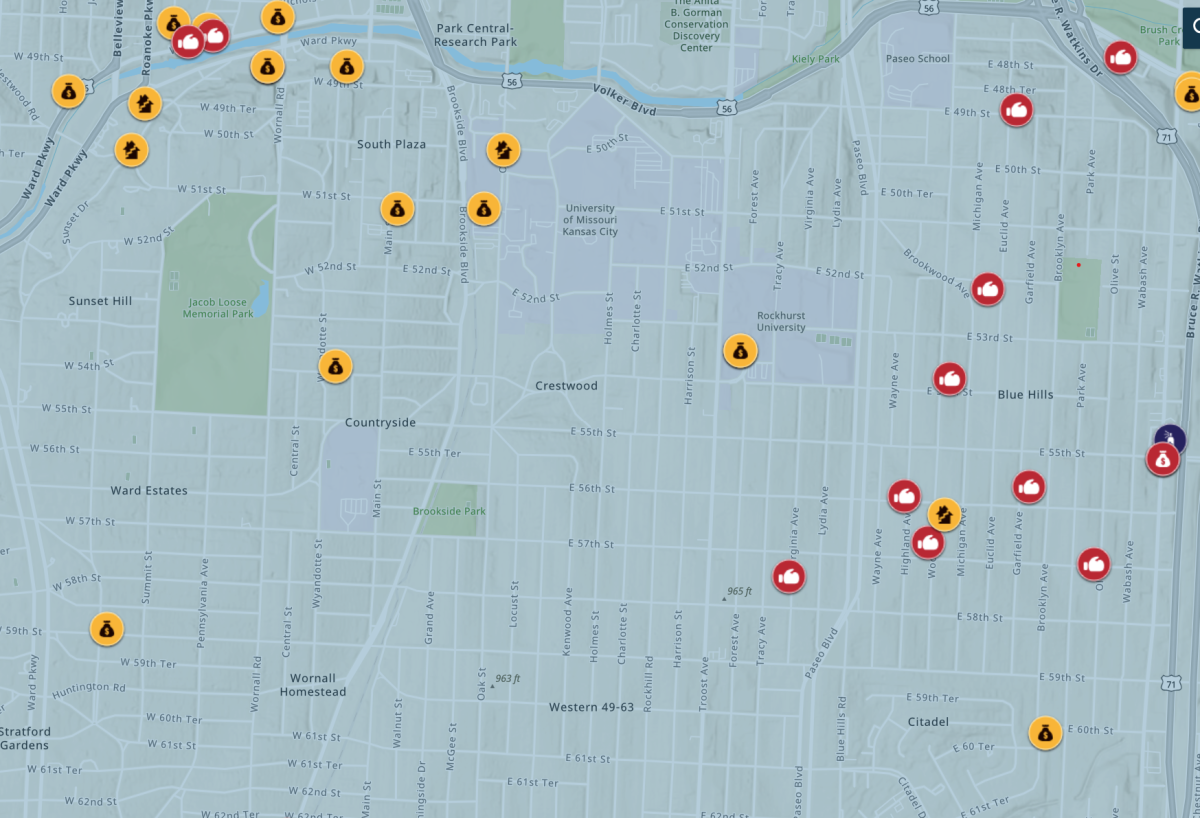by Chelsea Birchmier
Hundreds of people march across Wyandotte Street chanting phrases like “Banks got bailed out, we got sold out!” Written on the back of someone’s car are the words “It’s not about right vs left. It is about right vs wrong.” A young man in a “V for Vendetta” Guy Fawkes mask holds a sign that says “Being young means we have the most to lose by being idle.” People in “We are the 99 percent” shirts greet newcomers who join the event. “Welcome to National Call to Action Day,” they say, “And welcome to Occupy Kansas City.”
Occupy Kansas City, which began Sept. 30, is one of many protests that branched off of the Sept. 17 Occupy Wall Street movement in New York City. In Kansas City, protesters camp out in shifts at Penn Valley Park, near the Liberty Memorial and the Federal Reserve Bank. Protesters hope to call government officials’ attention to what they see as unfair control of politics by corporations. The fact that 1 percent of the population controls half of the nation’s wealth inspired the movement’s “We are the 99 percent” slogan.
Some politicians and media figures have criticized protesters for having no clear, united message. However, supporters of the movement say that they do have a message, one that the politicians are ignoring. It’s a message of equal opportunity, they say, that has allowed communities from around the world to come together in support of a common cause.
STA junior Lena White, who attended the first major Occupy Kansas City march Oct. 9, believes that supporters of the protest need more time to decide on a collective course of action.
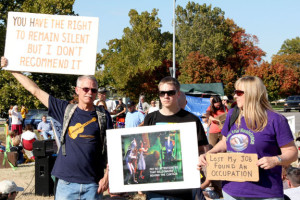
“The protest is still very young,” White said. “Right now, it’s more of a manifestation of discontent and unhappiness with the way that things are being run. I think what’s important is that the Occupy movements are tending to operate in a way that they’d rather see the country operate. They’re making all decisions by consensus, rather than having one person that’s the biggest and the most wealthy making the decisions.”
White also believes that when 1 percent of the population controls half of a nation’s wealth, a country can hardly say it offers equal opportunity to all citizens. White explained her views through an infographic she saw on a website called OccupyGeorge.com.
“[The infographic] showed the top 1 percent [of 150,000,000 people], about 400 people, controlling half of the wealth,” White said. “That’s very striking because if you think about it, 400 people is less than we have in this school. It is not right for a country that champions freedom and equality to have this kind of wealth disparity.”
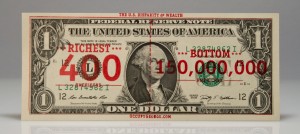
Unlike White, junior Allison Hogan, who witnessed an Occupy Wall Street protest in New York, does not fully support the goals of the protesters. She does not believe distributing the wealth is the answer to income disparity.
“One protester was being interviewed, and he said people who earn more money shouldn’t be spending it on things that they don’t need,” Hogan said. “Personally, I disagree because I think that people who work for their own money and are successful should be able to spend their money on whatever they want and shouldn’t have to be giving it to people who don’t work for theirs. If someone in your class got an A and another got a D, but they didn’t think that was fair so a teacher lowered yours to a B, that’s not fair.”
Hogan also feels that protesters may cause more harm than good because of the way they run the protests.
“I think the protesting is just going to end in violence and that they should be more peacefully assembled,” Hogan said. “[Protesters] were trashing the streets, and I just think they were handling it the wrong way.”
Although not everyone supports the protesters’ beliefs, White feels all students should at least inform themselves about the Occupy movement.
“I think that at St. Teresa’s, a lot of people are not as interested in politics because they’re worried about divisions it might cause in their social life,” White said. “Some people disagree with me, but I still think it’s good to be knowledgeable about it and be able to defend your argument. Also, from a Catholic point of view, it’s very important to think about because Catholic social teachings involve the rights of workers and options for the poor and vulnerable.”
Occupy Kansas City quick facts:
-According to an estimate by the Kansas City Star, around 300 people gathered Oct. 9 to march from Penn Valley Park to the J.C. Nichols fountain.
-Oct. 15, on National Call to Action Day, around 600 people gathered in Kansas City according to an estimate by the New York Times.
-Oct. 30 a rally called “We are One” took place at 2 p.m. at Ilus Davis Park in Kansas City.
-Nov. 5 protesters will join for “Bank Transfer Day” at a location to be announced.
Look here for more information on the Occupy protests: https://www.dartnewsonline.com/2011/10/occupy-movements-continue-in-kansas-city-as-protesters-camp-out-by-liberty-memorial/
Part of White’s interest in the movement originates from her family’s experience with inequality. Because her father’s family struggled financially and her mother came from a family of immigrants, she says she understands that working hard is no guarantee for economic stability.
“A child born into a class that’s not a wealthy one has a really time moving up,” White said. “And I say that from a family that’s worked really hard and sacrificed a lot to stay in the middle class. There are a lot of people whose circumstances just don’t let them do that. There is a problem with social mobility.”
Ms. Kai Smith, a former civics teacher, has attended the protests since day one. Like White, she feels concerned about where America’s economy and politics are headed.
“In examination of the history of my nation, what our Constitution entails doesn’t match up with the way politics are run today,” Smith said. “I’m certainly concerned with the influence that corporations have on our political structure, particularly after the Citizens United Ruling.”
The 2010 ruling Smith is referring to is the Citizens United v. Federal Election Commission case. In this case, the Supreme Court decided 5-4 in favor of Citizens United, allowing corporations to spend unlimited amounts of money to support political campaigns.
“To me [Citizens United is] too close of a relationship between a corporate structure and our government, which is supposed to be of the people, by the people, and for the people, not corporations,” Smith said.
Take this quiz and see what politicians are saying about the Occupy protests.
Smith also said that her daughter, Grace, who is almost 5 months old, has become a sort of mascot for the movement.
“I want to see my daughter have whatever opportunities there are available,” Smith said. “I don’t want somebody else to determine what’s available to her. I want her to decide what’s available to her. I don’t want her to be limited just because we don’t have $2,000,000 in her bank account.”
Smith’s 5-month-old daughter was not the only child who attended the protest. Many youth, especially teens, participated as well, with signs like one young boy’s that said “This is MY future.” Smith believes that if people of all ages can continue to come together to support each other, then the protest will continue to gain momentum.
“I think the success we see now is that every day we have more people coming, more people asking questions and entering into conversation,” Smith said. “What this is really about is reclaiming our community and being able to come together as a community. To have conversations with individuals about what we want to see for ourselves and for our neighbors, that’s where it starts.”
Like Smith, White also believes that–whether or not people support every aspect of the protest–the movement reflects true democracy, as people from different political parties and professions join hands for a common cause.
“[Occupy Kansas City] was a really great way for people to voice the way they’re feeling about the state of affairs in this country right now,” White said. “It was really powerful, this image of all these people walking and being in solidarity over a common issue. I think that just doesn’t happen as much in this country as it used to.”



